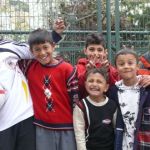The training by ""Establishing a Countrywide Network in Turkey for Monitoring and Covering Media Freedom and Independent Journalism" (BIA²) Project by IPS Communications Foundation, and the Turkey branch of United Nations Children's Fund (UNICEF) was held on February 4-5.
The participants discussed how a child-friendly media, which allows children's participation can be created. Both the participants and the educators highlighted that the media always equates children with trouble.
Maybe because the numbers of women participants were higher in Adana compared to previous seminars in other provinces, no discussion was held on the "criminal child" cliche.
More than 40 local reporters, lawyers, and non-governmental organization representatives from Adana, Gaziantep, Iskenderun, Kahramanmaras, Mersin and Osmaniye discussed how children could have their voices heard.
The participants also talked about how official statements may constitute violations of the rights of the children, and what the reporters can do in those cases.
"Children do not want to be represented negatively in the media," said Associate-Professor Doctor Gulgun Tosun from the Communications Department of Ege University.
"We need photographs and programs that show children involved in positive activities instead of ones that show them under the most difficult circumstances," added Degirmencioglu. "They want to be visible with every aspect of their lives."
Journalist Ragip Duran, who also teaches at the Galatasaray University, expressed the "need to accept children as independent individuals."
"Our opinions have been altered"
"This was an important effort in terms of making children visible," said Murat Gunes from Gaziantep's Beyaz Sayfa (White Page) newspaper, at the end of the training. "Especially in legal terms, our opinions have been altered."
Mihriban Amanoglu from the Bugun Mersin (Today Mersin) newspaper, who frequently writes news about children, said: "I have learned a lot on a subject I thought I knew well."
Hosta: Local media can best create a children's language
Sema Hosta, who is responsible of the UNICEF Communications Program, talked about the 5-year New Country Programme, which will go on from 2006 till 2013, and said their main goal is "to enable children to have their voices heard and to create a children's language."
Hosta highlighted that the local media is closer to the people compared with the national media, and said the local media can best create a children's language.
Onat: Media is the main factor in enabling children to attain their rights
Yasemin Onat, a lawyer from the Antalya Bar Association, talked about the United Nations (UN) Convention on the Rights of the Child and the regulations on children's rights.
Onat said that the media is as much responsible as the parents, to enable children to attain their basic rights, which are to live, develop, be protected and participate.
The participants analyzed the expectations of the children, families, society and media institutions from the media during the "Role of Media" workshop directed by Onat.
The workshop revealed the following:
Children's expectations from the media: They expect the media to ask them for their opinions, they expect their rights to be respected, they expect to be valued, they expect not to be exposed and exploited, they expect to be the subject of news with positive aspects.
Families' expectations from the media: They expect their children not to be exposed, not to be labeled, not to be offended, and they expect their children to be supported.
Onat also drew attention to two important responsibilities that have been imposed on the media by the Convention on the Rights of the Child:
* The media should prepare news that comply with the needs of the children and these should be easily accessible.
* The media should not prepare news that has a harming or labeling effect.
Lastly, Onat said that the media should not use the expressions "criminal child or homeless child." They should instead say "children who have been pushed into committing crimes," "children who have been forced to live on the streets," or "children who are in danger of living or working on the streets."
Tosun: Reporters should work to create a child-friendly media
Gulgun Tosun, through news clips, showed how the media violates children's rights and called on the reporters to work to create a child-friendly media.
Tosun argued that news, by nature, cannot be the reality itself or objective. She added that rights are excluded when news replace the reality.
"If you are going to be a side, be on the side of citizens, on the side of rights."
Tosun called on the reporters to extend the microphone to children, and said paying attention to children's rights when reporting is related with being the voice of children.
Tosun said the following points are important in creating a child-friendly media:
* Covering children's rights
* Exposing the processes that violate children's rights instead of exposing children
* Looking for ways to improve the widespread image of children,
* Looking for ways to allow children to participate in the media,
* Looking for ways for children to protect themselves from harmful effects.
"Don't take official statements as the single truth"
Tosun said that most of the news that violate children's rights are those which only rely on information given by police, law enforcement officials or local administrators. She warned journalists should strive to prepare balanced reports.
A participant said: "We don't have the chance to investigate a report coming from the Governor's Office."
"What is the use of being a journalist if you are not going to be able to investigate," replied another.
The journalists agreed on the need to investigate and confirm official statements.
Ahmet Orhan from Gaziantep's "Turkiyem" (My Turkey) newspaper, drew attention to the fact that the administrative units put pressure on local media:
"We are worried when we criticize administrators. We don't have the power. They don't bother with the national media, but they threaten the local media."
Another point raised by the participants was the economic pressure:
"Even if we are right legally, we may end up suffering financially."
During a discussion over news reports that expose and label children, Ozay Dogan from Osmaniye's "Bahcenin Sesi" (Voice of the Garden) newspaper made an interesting comment:
"Since children cannot defend themselves, reporters write about them, instead of writing about those who victimize them. When a news is being prepared, the journalists may think 'the adult who has victimized this child may go to court, he/she may be an influential person."
Tosun reminded journalists that legal action may be taken in the case of violation of children's rights.
Degirmencioglu: The way to make participation possible is to work with children
According to Serdar Degirmencioglu, preparing news on children with problems strictly and focusing only on that, amounts to paparazzi reporting.
Degirmencioglu talked about how children can participate in the media and said: "children's participation is essential for the future of the media."
"Media has to stand by the children. If that happens, then children may start taking the media seriously."
Fatih Demir from Adana's Radyo Dunya (Radio World) said there has been an increase in the number of child listeners since they started airing the "Children's Radio" programs prepared by bia2 for the local media.
Demir said that the increase in the number of listener has lead to an increase in advertising revenues.
Demircioglu showed the participants examples of programs in Turkey and in the world, prepared with the participation of children and asked: "Would you do this?"
The response came from Ozay Dogan:
"Yes because children are not scared of anything. They explain certain things in such a nice and simple way..."
Why are they killing all the birds?
Ragip Duran talked about a guide by UN's UNICEF, World Health Organization (WHO) and Food and Agriculture Organization (FOA) about the avian influenza, reminding that children are the most defenseless in the face of the disease. "The journalists have the responsibility to inform the people on all pandemics," said Duran.
He talked about the importance of covering the right story at the right time and writing or preparing news in a true and simple way, which can be understood by everyone.
During the break, two children of the participants, Nazim and Turkbey started talking with Duran about the avian influenza.
Their question was the simplest and most striking question on the destruction of birds in Turkey:
"Why are they killing all the birds?"
Duran: Parents should give their consent for the interview
Duran then listed the issues that a reporter must pay attention to when interviewing a child:
* The child must be regarded as an independent individual,
* The child must feel comfortable at the location of the interview,
* The reporter must get permission from the child's parents for the interview,
* The language must be simple and understandable; the questions must be clear,
* The questions must not lead the child to answer in a certain way.
* The child's privacy must be respected,
* The questions must not remind the child of past pains and cause him/her agony.
The participants later analyzed some news by the national media, determined children's rights violations and rewrote the news in a workshop directed by journalist Ahmet Sik.
The participants saw that, although children under the age of 12 do not have criminal liability, many news reports are prepared from the viewpoint of law enforcement officials and use a language that accuse, expose and label those children.
The comments by Hafize Kurt from Osmaniye's "Haber" (News) newspaper were striking:
"If I had not attended this training, I would have published these news clips as they are and, who knows how many news reports I would have written in this same manner" (TK/EA/YE)












